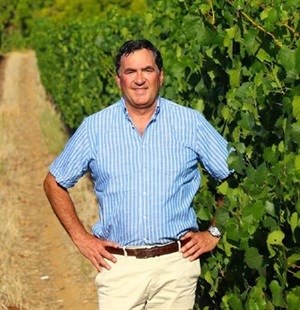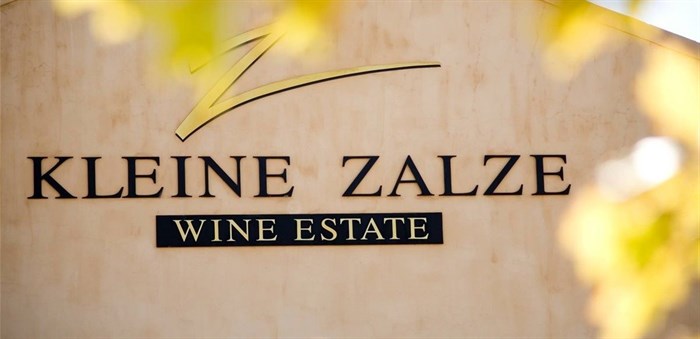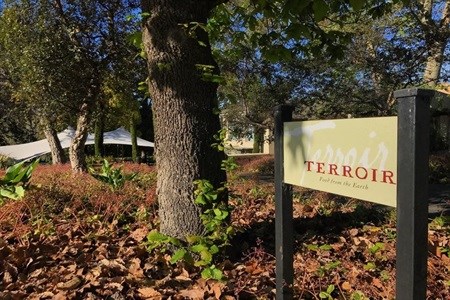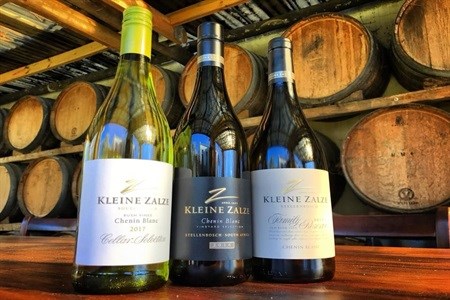
Related
Top stories





ESG & SustainabilitySouth Africa’s carbon tax should stay: climate scientists explain why
Britta Rennkamp et al. 42 minutes

More news















Recently, the Stellenbosch estate was singled out at the annual UK Sommelier Wine Awards as the Best New World Producer of the Year and received seven medals in addition to this accolade. This achievement follows Kleine Zalze’s recognition as top South African wine brand in the on-premise trade in the UK alongside brands like Laurent Perrier, Taittinger, Baron Phillipe De Rothschild and Dom Perignon, and its inclusion in the 2018 Top Wine SA Hall of Fame.
As managing director of Kleine Zalze over the last 15 years, Kobus Basson and his family have evolved the wine estate into the most awarded in Stellenbosch; marrying agricultural knowledge and business acumen to produce successful results in their day-to-day management of the business.
We caught up with Basson to find out more on what this recognition means for the Kleine Zalze wine brand…
We have invested heavily in our terroir, staff, and markets, so it is extremely gratifying to be named Best New World Producer of the Year. It’s also very significant for us as a South African company to be among the world’s most recognisable and historic wine brands. The international stage is massive with thousands of brands and SKU’s out there. Everyone is trying to produce better wine and be the best they can be.

Once you compete on the international stage you move from competing against 9,000 SA SKU’s to around 90,000 internationally. It is not an easy task and you have to think smart, work hard and better the quality of your wine on a daily basis.
Yes, we have overcome our current challenges but life will always throw a challenge your way.
That is what makes life and the wine industry very exciting. There is never a dull moment, and if you stagnate, you will get left behind.
Consistency is key. You have to ensure that the quality of your wine does not fluctuate too much on an annual basis. We are blessed that our climate tends to be very consistent compared to European countries who might have an amazing harvest in 2017 but two terrible harvests in 2018 and 2019. It also depends on if you want to be a volume brand at lower price points or smaller volume producer at higher price points.
The customer is key to the survival of any brand. If you don’t have any customers, you won’t sell any wine. Your first link in the chain of customers will be your national distributor or international importer/s. Your relationship with them is critical and has to be immensely strong. That is the foundation of our success. The second link would be their sales staff who you also have to build a strong bond with.
Most distributors or importers have thousands of wines in their portfolio. Why should they choose to sell yours? The third link is the on and off-trade i.e. grocers, specialist retail stores, restaurants, hotels and pubs. The end consumer buys from them and it is all about the experience they create for the end consumer that makes them decide to buy your wine. If the servers in a restaurant are familiar with your wines, they will suggest it first.
Refining and improving the quality of our wine is a daily objective...
It is a rather complicated process with no very definitive answer as there are usually a number of subjective decisions that need to be taken into account. At Kleine Zalze we will first do what we refer to as a 'terroir study', for each specific site. This process will evaluate and quantify a number of parameters including, but not limited to, daylight hours, solar radiation, aspect, drainage, soil profile, soil analysis, slope, drainage, average summer temperature, rainfall, etc.
We use this information to determine what varieties might be best suited to the site and then compare it (where possible) with wines that have been made from vineyards planted on those sites in the past. We will then use this information to decide what we feel will work best for us, highlighting our expression of variety and place on a specific site.
We at Kleine Zalze feel that almost any site or terroir can work depending on whether or not the correct variety is planted on that specific site. So what we do is try to find, if we have not planted them ourselves, pockets of fruit that we feel allow us to express the true sense of place. Depending on the variety that we are working with that may mean working with very different terroirs.
In Stellenbosch we work with mostly decomposed granite soils with reasonably high clay content, yet, at the same time, well drained. Depending on the meso and micro-climates, specific aspect and location of a block, within this broader context, will influence the variety that we will work with on a particular block. Cool slight lighter soils (i.e. less clay) will generally favour white varieties like Chenin blanc and the warmer yet moderate heavier soils favour the red varieties that we work with namely Cabernet Sauvignon and Shiraz.



That is a hard question and almost like someone asking you to choose your favourite child if you have three. They are all different, you have to analyse them, work with their positives and negatives to create the best environment for them to be successful. Once you have done that, it is up to mother nature which is out of our control. We do, however, work with a lot with decomposed granite soils.
First and foremost to educate and develop our staff even more on a daily basis. Education is key and something we lack not just in South Africa, but in the world. From the winemaking side, we always have lots of things on the go, we are always striving to refine and improve our wines and are always challenging ourselves to ensure the best expression of place and variety in our wines.
We are also continually evaluating new techniques and varieties in what we like to refer to as our R&D (research and development) department. Here we evaluate ways and means to try an improve what we do by thinking a little "out the box". Every now and again we happen to make some truly unique R&D wines that may not be quite relevant to the Kleine Zalze profile but is interesting in its own right and still very interesting, nonetheless… so all we can really say is watch this space!
From a sales perspective, there are always markets to break into. Kleine Zalze focussed heavily on Sweden, Germany, Holland, UK and South Africa over the last 22 years. We still see these as our focus markets but there is so much potential out there which will mean one will have to pound the pavements and that includes countries like the USA, Canada and Japan.
To build even stronger, professional relationships with our staff; national distributors, international importers, retail outlets, restaurants, hotels, pubs and the end consumer. Refining and improving the quality of our wine is a daily objective and last but not least, flying the South African flag high.